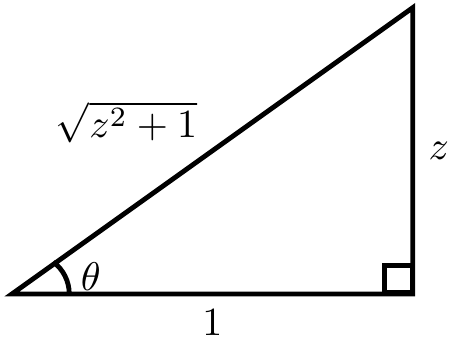Difference between revisions of "Derivative of arctan"
From specialfunctionswiki
| (One intermediate revision by the same user not shown) | |||
| Line 5: | Line 5: | ||
==Proof== | ==Proof== | ||
| − | If $\theta=\mathrm{arctan}(z)$ then $\tan \theta = z$. Now | + | If $\theta=\mathrm{arctan}(z)$ then $\tan \theta = z$. Now [[implicit differentiation]] with respect to $z$ yields |
$$\sec^2(\theta)\theta'=1.$$ | $$\sec^2(\theta)\theta'=1.$$ | ||
The following triangle shows that $\sec^2(\mathrm{arctan}(z))=z^2+1$: | The following triangle shows that $\sec^2(\mathrm{arctan}(z))=z^2+1$: | ||
| Line 16: | Line 16: | ||
[[Category:Theorem]] | [[Category:Theorem]] | ||
| + | [[Category:Proven]] | ||
Latest revision as of 13:05, 22 September 2016
Theorem
The following formula holds: $$\dfrac{\mathrm{d}}{\mathrm{d}z} \mathrm{arctan}(z) = \dfrac{1}{z^2+1},$$ where $\mathrm{arctan}$ denotes the inverse tangent function.
Proof
If $\theta=\mathrm{arctan}(z)$ then $\tan \theta = z$. Now implicit differentiation with respect to $z$ yields $$\sec^2(\theta)\theta'=1.$$ The following triangle shows that $\sec^2(\mathrm{arctan}(z))=z^2+1$:
Substituting back in $\theta=\mathrm{arccos(z)}$ yields the formula $$\dfrac{\mathrm{d}}{\mathrm{d}z} \mathrm{arccos(z)} = \dfrac{1}{\sec^2(\mathrm{arctan(z)})} = \dfrac{1}{z^2+1},$$ as was to be shown. █
